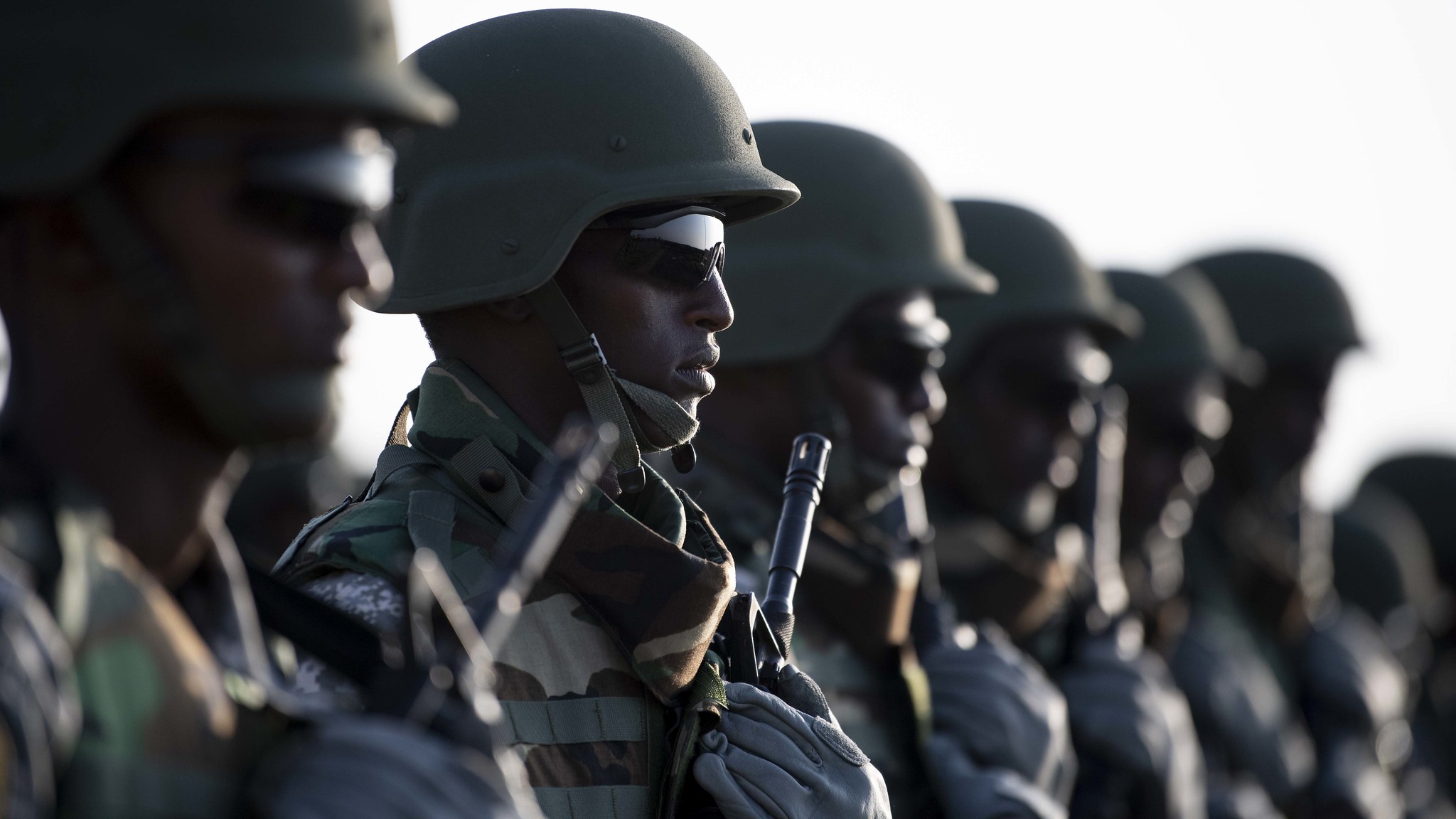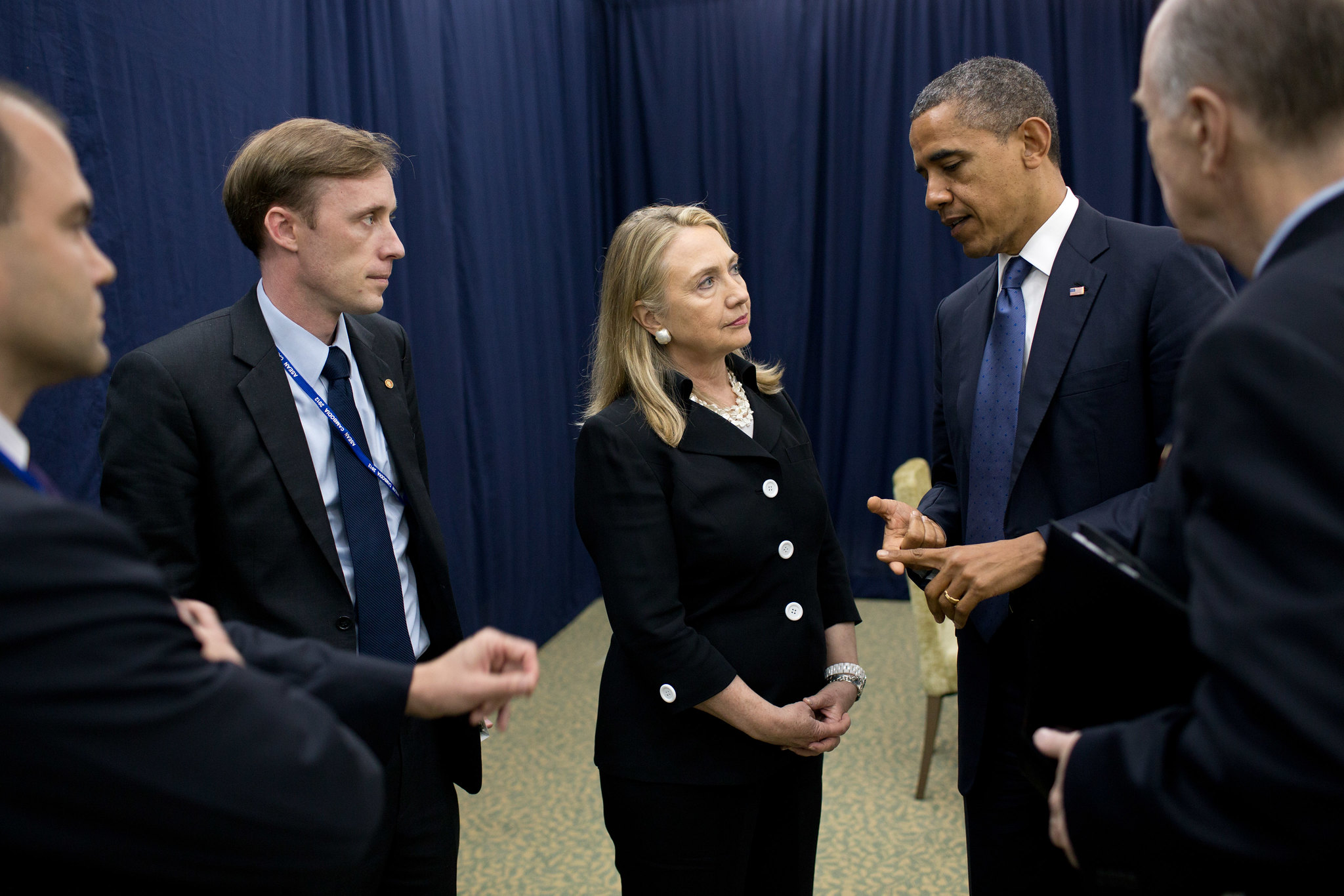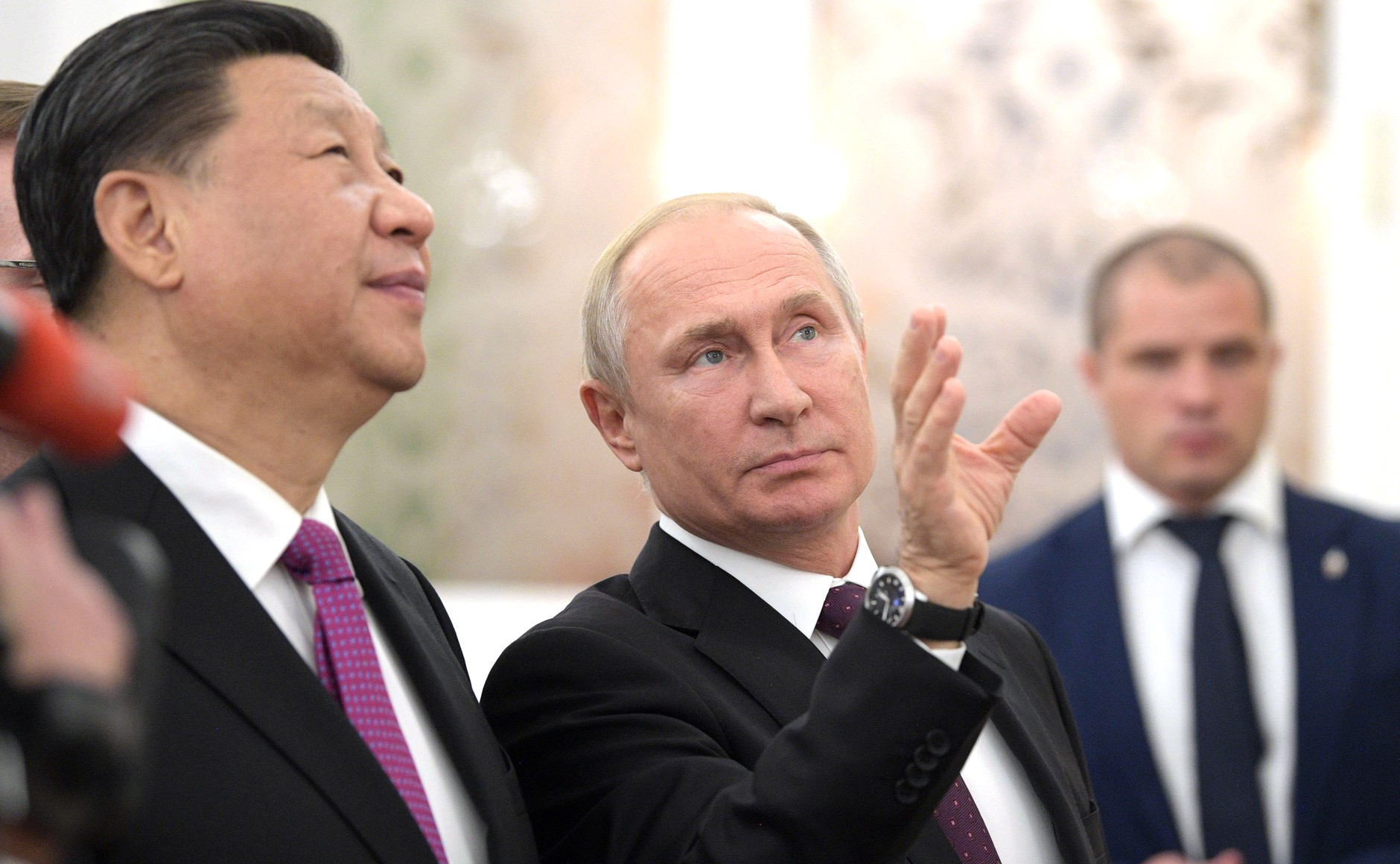Danny Sjursen offers a Bidenesque tour of U.S. militarism.

2009: Vice President Joe Biden with U.S. sailors stationed in San Diego who were preparing to deploy to the Western Pacific and Indian Ocean. (U.S. Navy, Amanda L. Ray)
By Danny Sjursen
Tom’s Dispatch
 Hard as it is to believe in this time of record pandemic deaths, insurrection, and an unprecedented encore impeachment, Joe Biden is now officially at the helm of the U.S. war machine. He is, in other words, the fourth president to oversee America’s unending and unsuccessful post-9/11 military campaigns.
Hard as it is to believe in this time of record pandemic deaths, insurrection, and an unprecedented encore impeachment, Joe Biden is now officially at the helm of the U.S. war machine. He is, in other words, the fourth president to oversee America’s unending and unsuccessful post-9/11 military campaigns.
In terms of active U.S. combat, that’s only happened once before, in the Philippines, America’s second-longest (if often forgotten) overseas combat campaign.
Yet that conflict was limited to a single Pacific archipelago. Biden inherits a global war — and burgeoning new Cold War — spanning four continents and a military mired in active operations in dozens of countries, combat in some 14 of them, and bombing in at least seven.
That sort of scope has been standard fare for American presidents for almost two decades now. Still, while this country’s post-9/11 war presidents have more in common than their partisan divisions might suggest, distinctions do matter, especially at a time when the White House almost unilaterally drives foreign policy.
So, what can we expect from Commander-in-Chief Biden? In other words, what’s the forecast for U.S. service-members who have invested their lives and limbs in future conflict, as well as for the speculators in the military-industrial complex and anxious foreigners in the countries still engulfed in America’s war on terror who usually stand to lose it all?
Many Trumpsters, and some libertarians, foresee disaster: that the man who, as a leading senator facilitated and cheered on the disastrous Iraq War, will surely escalate American adventurism abroad. On the other hand, establishment Democrats and most liberals, who are desperately (and understandably) relieved to see Donald Trump go, find that prediction preposterous.
Clearly, Biden must have learned from past mistakes, changed his tune, and should responsibly bring U.S. wars to a close, even if at a time still to be determined.
In a sense, both may prove right — and in another sense, both wrong. The guess of this long-time war-watcher (and one-time war fighter) reading the tea leaves: expect Biden to both eschew big new wars and avoid fully ending existing ones.
At the margins (think Iran), he may improve matters some; in certain rather risky areas (Russian relations, for instance), he could worsen them; but in most cases (the rest of the Greater Middle East, Africa, and China), he’s likely to remain squarely on the status-quo spectrum. And mind you, there’s nothing reassuring about that.

Sgt. John Hoxie watches 82nd Airborne Division’s All American Week celebration May 18, 2009. Hoxie returned to Fort Bragg for the first time since he was injured during a 2007 deployment to Iraq. (U.S. Army/Flickr)
It hardly requires clairvoyance to offer such guesswork. That’s because Biden basically is who he says he is and who he’s always been, and the man’s simply never been transformational. One need look no further than his long and generally interventionist past record or the nature of his current national-security picks to know that the safe money is on more of the same.
Whether the issues are war, race, crime, or economics, Uncle Joe has made a career of bending with the prevailing political winds and it’s unlikely this old dog can truly learn any new tricks.
Furthermore, he’s filled his foreign policy squad with Obama-Clinton retreads, a number of whom were architects of — if not the initial Iraq and Afghan debacles — then disasters in Libya, Syria, West Africa, Yemen, and the Afghan surge of 2009. In other words, Biden is putting the former arsonists in charge of the forever-war fire brigade.
There’s further reason to fear that he may even reject Trump’s “If Obama was for it, I’m against it” brand of war-on-terror policy-making and thereby reverse The Donald’s very late, very modest troop withdrawals in Afghanistan, Iraq, and Somalia.
Yet even if this new old hand of a president evades potentially existential escalation with nuclear Russia or China and offers only an Obama reboot when it comes to persistent low-intensity warfare, what he does will still matter — most of all to the global citizens who are too often its victims.
So, here’s a brief region-by-region flyover tour of what Joe’s squad may have in store for both the world and the American military sent to police that world.
The Middle East: Old Prescriptions for Old Business
It’s increasingly clear that Washington’s legacy wars in the Greater Middle East — Iraq and Afghanistan, in particular — are generally no longer on the public’s radar. Enter an elected old man who’s charged with handling old business that, at least to most civilians, is old news.
Odds are that Biden’s ancient tricks will amount to safe bets in a region that past U.S. policies essentially destroyed. Joe is likely to take a middle path in the region between large-scale military intervention of the Bush or Obama kind and more prudent full-scale withdrawal.
As a result, such wars will probably drag on just below the threshold of American public awareness, while avoiding Pentagon or partisan charges that his version of cutting-and-running endangered U.S. security. The prospect of “victory” won’t even factor into the equation (after all, Biden’s squad members aren’t stupid), but political survival certainly will.
Here’s what such a Biden-era future might then look like in a few such sub-theaters.
“Wars will probably drag on just below the threshold of American public awareness.”
The war in Afghanistan is hopeless and has long been failing by every one of the U.S. military’s own measurable metrics, so much so that the Pentagon and the Kabul government classified them all as secret information a few years back.
Actually dealing with the Taliban and swiftly exiting a disastrous war likely to lead to a disastrous future with Washington’s tail between its legs is, in fact, the only remaining option. The question is when and how many more Americans will kill or be killed in that “graveyard of empires” before the U.S. accepts the inevitable.

U.S. Army helicopter pilots fly near Jalalabad, Afghanistan, April 5, 2017. (U.S. Army, Brian Harris, Wikimedia Commons)
Toward the end of his tenure, Trump signaled a serious, if cynical, intent to so. And since Trump was by definition a monster and the other team’s monsters can’t even occasionally be right, a coalition of establishment Democrats and Lincoln-esque Republicans (and Pentagon officials) decided that the war must indeed go on. That culminated in last July’s obscenity in which Congress officially withheld the funds necessary to end it.
As vice president, Biden was better than most in his Afghan War skepticism, but his incoming advisers weren’t, and Joe’s nothing if not politically malleable. Besides, since Trump didn’t pull enough troops out faintly fast enough or render the withdrawal irreversible over Pentagon objections, expect a trademark Biden hedge here.
Syria has always been a boondoggle, with the justifications for America’s peculiar military presence there constantly shifting from pressuring the regime of Bashar al-Assad, to fighting the Islamic State, to backing the Kurds, to balancing Iran and Russia in the region, to (in Trump’s case) securing that country’s meager oil supplies.
As with so much else, there’s a troubling possibility that, in the Biden years, personnel once again may become destiny. Many of the new president’s advisers were bullish on Syrian intervention in the Obama years, even wanting to take it further and topple Assad.
Furthermore, when it comes time for them to convince Biden to agree to stay put in Syria, there’s a dangerous existing mix of motives to do just that: the emotive sympathy for the Kurds of known gut-player Joe; his susceptibility to revived Islamic State (ISIS) fear-mongering; and perceptions of a toughness-testing proxy contest with Russia.
When it comes to Iran, expect Biden to be better than the Iran-phobic Trump administration, but to stay shackled “inside the box.”
First of all, despite Joe’s long-expressed desire to reenter the Obama-era nuclear deal with Iran that Trump so disastrously pulled out of, doing so may prove harder than he thinks. After all, why should Tehran trust a political basket case of a negotiating partner prone to significant partisan policy-pendulum swings, especially given the way Washington has waged nearly 70 years of interventions against Iran’s politicians and people?
In addition, Trump left Biden the Trojan horse of Tehran’s hardliners, empowered by dint of The Donald’s pugnacious policies. If the new president wishes to really undercut Iranian intransigence and fortify the moderates there, he should go big and be transformational — in other words, see Obama’s tension-thawing nuclear deal and raise it with the carrot of full-blown diplomatic and economic normalization. Unfortunately, status-quo Joe has never been a transformational type.
Keep an Eye on Africa

Djiboutian soldiers, Oct. 31, 2019. (U.S. Air Force, J.D. Strong II)
Though it garners far less public interest than the U.S. military’s long-favored Middle Eastern playground, Africa figures significantly in the minds of those at the Pentagon, in the Capitol, and in Washington’s influential think-tanks.
For interventionist hawks, including liberal ones, that continent has been both a petri dish and a proving ground for the development of a limited power-projection paradigm of drones, Special Operations forces, military advisers, local proxies, and clandestine intelligence missions.
It mattered little that over eight years of the Obama administration — from Libya to the West African Sahel to the Horn of East Africa — the war on terror proved, at best, problematic indeed, and even worse in the Trump years.
There remains a worrisome possibility that the Biden posse might prove amenable yet again to the alarmism of U.S. Africa Command (AFRICOM) about the rebirth of ISIS and the spread of other al-Qaeda-linked groups there, bolstered by fear-mongering nonsense masquerading as sophisticated scholarship from West Point’s Combating Terrorism Center, and the Pentagon’s perennial promises of low-investment, low-risk, and high-reward opportunities on the continent.
So, a savvy betting man might place chips on a Biden escalation in West Africa’s Sahel and the Horn of East Africa, even if for different reasons.
American Special Forces and military advisers have been in and out of the remote borderlands between Mali and Niger since at least 2004 and these days seem there to stay. The French seized and suppressed sections of the Sahel region beginning in 1892, and, despite granting nominal independence to those countries in 1960, were back by 2013 and have been stuck in their own forever wars there ever since.
American war-on-terror(izing) and French neo-colonizing have only inflamed regional resistance movements, increased violence, and lent local grievances an Islamist resonance. Recently, France’s lead role there has truly begun to disintegrate — with five of its troops killed in just the first few days of 2021 and allegations that it had bombed another wedding party. (Already such a war-on-terror cliché.)
Don’t be surprised if French President Emmanuel Macron asks for help and Biden agrees to bail him out. Despite their obvious age gap, Joe and Emmanuel could prove the newest and best of chums. (What’s a few hundred extra troops between friends?)
Especially since Obama-era Secretary of State Hillary Clinton and her then-favored errand boy, inbound national security adviser Jake Sullivan, could be said to have founded the current coalition of jihadis in Mali and Niger.
That’s because when the two of them championed a heavy-handed regime-change intervention against Libyan autocrat Muammar Gaddafi in 2011, thousands of his Tuareg fighters blew back into that region in a big way with more than just the clothes on their backs. They streamed from post-Gaddafi Libya into their Sahel homelands loaded with arms and anger.
It’s no accident, in other words, that Mali’s latest round of insurgency kicked off in 2012. Now, Sullivan might push new boss Biden to attempt to clean up his old mess.

Jake Sullivan, second from left, as deputy chief of staff to the secretary of state, with his boss Hillary Clinton and President Barack Obama, Nov. 20, 2012. (White House, Pete Souza)
On the other side of the continent, in Somalia, where Trump began an 11th-hour withdrawal of a long-failing and aimless U.S. troop presence (sending most of those soldiers to neighboring countries), there’s a real risk that Biden could double-down in the region, adding soldiers, special operators, and drones.
After all, if Trump was against it, even after exponentially increasing bombing in the area, then any good Democrat should be for it, especially since the Pentagon has, for some time now, been banging the drum about Somalia’s al-Shabaab Islamist outfit being the biggest threat to the homeland.
However, the real selling point for Biden might be the fantasy that Russia and China are flooding into the region. Ever since the 2018 National Defense Strategy decisively shifted the Pentagon’s focus from counterterror wars to “great power competition,” or GPC, AFRICOM has opportunistically altered its own campaign plan to align with the new threat of the moment, homing in on Russian and Chinese influence in the Horn region.
As a result, AFRICOM’S come-back-to-the-Horn pitch could prove a relatively easy Biden sell.
Russian Bears & Chinese (Sea) Dragons

Chinese President Xi Jinping, left, with Russian President Vladimir Putin during visit to Moscow for state visit, Xi Jinping. (Kremlin)
With that new GPC national security obsession likely to be one Trump-era policy that remains firmly in place, however ill-advised it may be, perhaps the biggest Biden risk is the possibility of stoking up a “new,” two-theater, twenty-first-century version of the Cold War (with the possibility that, at any moment, it could turn into a hot one).
After making everything all about Russia in the Trump years, the ascendant Democrats might just feel obliged to follow through and escalate tensions with Moscow that Trump himself already brought to the brink (of nuclear catastrophe). Here, too, personnel may prove a key policy-driver.
Biden’s nominee for secretary of state, Anthony Blinken, is a resident Russia hawk and was an early “arm-Ukraine” enthusiast. Jake Sullivan already has a tendency to make mountains out of molehills on the subject, as when he described a minor road-rage incident as constituting “a Russian force in Syria aggressively attack[ing] an American force and actually injur[ing] American service members.”
Then there’s the troubling signal of Victoria Nuland, the recent nominee for undersecretary of state for political affairs, a pick that itself should be considered a road-rage-style provocation. Nuland has a history of hawkish antagonism toward Moscow and is reportedly despised by Russian President Vladimir Putin. Her confirmation will surely serve as a conflict accelerant.
Nevertheless, China may be the lead antagonist in the Biden crew’s race to risk a foolhardy cataclysm. Throughout the election campaign, the new president seemed set on out-hawking Trump in the Western Pacific, explicitly writing about “getting tough” on China in a March 2020 piece he penned in Foreign Affairs.
Joe had also previously called Chinese President Xi Jinping “a thug.” And while Michèle Flournoy may (mercifully) have been passed over for secretary of defense, her aggressive posture toward Beijing still infuses the thinking of her fellow Obama alums on Biden’s team.
As TomDispatch regular Andrew Bacevich pointed out last September, a Flournoy Foreign Affairs article illuminated the sort of absurdity she (and assumedly various Biden appointees) think necessary to effectively deter China.
She called for “enhancing U.S. military capabilities so that the United States can credibly threaten to sink all of China’s military vessels, submarines, and merchant ships in the South China Sea within 72 hours.” Consider that Dr. Strangelove-style strategizing retooled for an inbound urbane imperial presidency.
Endgame: War as Abstraction
Historically, foreign-policy paradigm shifts are exceedingly rare, especially when they tack toward peace. Such pivots appear almost impossible once the immense power of America’s military-industrial complex, invested in every way in endless war, as well as endless preparations for future Cold Wars, has reached today’s grotesque level.
This is especially so when each and every one of Biden’s archetypal national security nominees has, metaphorically speaking, had his or her mortgage paid by some offshoot of that war industry. In other words, as the muckraking novelist Upton Sinclair used to say: “It is difficult to get a man to understand something when his salary depends upon his not understanding it!”
Count on tactics including drones, commandos, CIA spooks, and a mostly amenable media to help the Biden administration make war yet more invisible — at least to Americans. Most Trump-detesting, and domestically focused citizens will find that just dandy, even if exhausted troopers, military families, and bombed or blockaded foreigners won’t.
More than anything, Biden wishes to avoid overseas embarrassments like unexpected American casualties or scandalous volumes of foreign civilian deaths — anything, that is, that might derail his domestic agenda or hoped-for restorative leadership legacy.
That, unfortunately, may prove to be a pipe dream and leads me to two final predictions: formulaic forever war will never cease boomeranging back home to rot our republican institutions, and neither a celestial God nor secular History will judge Biden-the-war-president kindly.
Danny Sjursen is a retired U.S. Army officer and contributing editor at antiwar.com. His work has appeared in the LA Times, The Nation, Huff Post, The Hill, Salon, Truthdig, Tom Dispatch, among other publications. He served combat tours with reconnaissance units in Iraq and Afghanistan and later taught history at his alma mater, West Point. He is the author of a memoir and critical analysis of the Iraq War, Ghostriders of Baghdad: Soldiers, Civilians, and the Myth of the Surge. His latest book is Patriotic Dissent: America in the Age of Endless War. Follow him on Twitter at @SkepticalVet. Check out his professional website for contact info, scheduling speeches, and/or access to the full corpus of his writing and media appearances.
This article is from Tom’s Dispatch.
The views expressed are solely those of the author and may or may not reflect those of Consortium News.



American foreign policy, and to some degree domestic, lives inside the MIC bubble. It was something President Eisenhower and former highest ranking general warned about but only as he was leaving office. Since, not a single president has openly voiced a similar concern that I can remember. You can only surmise that our presidents enjoy the power the MIC conveys to them personally. Ordering drone murders, for example, might be done with crocodile tears but is a real ego trip. Some might note that the generals and spooks might also enjoy playing our president like a fiddle. Whether true or not, while the president boasted of killing Soleimani, the act was committed before informing the President. True or not, it is certainly plausible and then our president boasted about the murder.
Will it ever change? Lots of possibility but the most likely is one some nation or combination of them kicks our ass and physically threatens the folks in the White House and Congress. If anthrax scared the hell out of them post 911, as did a group of hoodlums on January 6, picture their state of mind if something like the aforementioned occurred.
Yes.
One might hope that Brzezinski’s desires for the USSR (Afghanistan in the 1980s…a deliberate creation of the CIA with the Taliban et al being the ultimate result)…becomes this portion of the continent’s fate…All empires Fall – though US hubris (well, I guess all empires are hubristic at the very least) prevents those in power, the corporate capitalist imperialist plutocratic ruling elites and their minions in Congress and the WH from being able to fully recognize or accept that (that twaddle about the beacon on the hill and all that utter, utter codswallop)…
No empires – Ta muchly…
“More than anything, Biden wishes to avoid overseas embarrassments..” Danny is way too optimistic…even before the ink was dry on this article:
Additional US troops have entered Syria. New CIC (Clown in Chief), same clown show!
Convoy of 40 Trucks and Armored Vehicles entered from Iraq via the al Waleed border-crossing.
At (roughly) the same time, 200 troops arrived via helicopter into Hasakeh province.
hXXps://www.i24news.tv/en/news/middle-east/1611293792-us-military-convoy-enters-northeast-syria-report
Interesting speculations. I think Sjursen’s optimistic, honestly.
There’s a tendency for Americans to imagine that a president in the opposition party will “go crazy” and cause a war. A nuclear war could rise from a sort of updated Strangelove scenario, but invasions and Grand Chessboard politics keep coming out of more stable and enduring delusions. That Biden will not conform to Republican publicity should be no relief from alarm.
I doubt that Biden sees decades of war as a failure. Recent wars were never engaged with the old idea of invasion–that the invading country would occupy the land, move a large part of its population there, settle it out, and employ the locals as domestics, peasants, and assembly-line workers. This has not been commonly done since the revamping of empire since WWII and Korea. Nowadays, local administration is mostly done with a Phoenix-style eminence gris of US agents in the background, and with a large US military base somewhere in the area whenever this becomes opportune. The combination of bribes and the threat of violence creates a sort of slave state of grand inefficiency and grotesque losses, but also with concentrated profit to some small group.
By public documents, it seems reasonable to trace through through the British Opium Wars in China up into the Japanese invasion of Manchuria, then with Phoenix in Vietnam, Contragate’s relationships to the Reagan White House and so to Clintons and Bushs, the Karzai Brothers’ opium trade in Afghanistan, and towards the present. The story has gaps, but the pattern repeats, and as research extends, the gaps have closed tellingly.
Biden is a man on the team, who “goes which way the wind blows” more or less, as Sjursen puts it. But we should not take this as a sign of moderation or centrality. Further, his strategy has not produced failure, but inauguration. His constituency are the rich donors to whom he promised that nothing would change, but even this promise is spurious, at least if taken literally. Nothing could be more preposterous in 2021 than to imagine that the Western world will not change. But he is likely understood to mean that he intends to keep the existing hierarchy in order.
What does this mean for war? It should not mean that war shall continue on most fronts, but it does. The assumption here is that hierarchy and war are the way of the species and the planet, the “best of all possible worlds” in the sense that Voltaire lampooned, and so Biden and associates shall continue. Biden works for people who intend to finish subjugating the planet, who find this sort of Lex Luthor politics natural and inevitable.
People in the military should leave as they can. The distinctions of fighting first or second in Africa or West or East or Central Asia will not be the most salient details of the stories that will emerge.
This and every other analysis of what Biden might do leaves out the reality that he is Brain Dead with Dementia.
That means for as long as he remains in office, this will be Obama’s 3rd term, run by mostly Obama’s people with a larding of
NeoConservatives, the Democrats new best friends.
According to the Treasury Department, the US is within spitting distance of being $28Trillion in the hole BEFORE Biden takes office. Russia, China, Iran, and others are trading in national currencies, not the dollar. The vassals in the EU, at long last tiring of being pushed around by the almighty dollar are finally getting serious about dispensing with it. We are going to be spending the big bux on corona relief and the list goes on. The wheels are gonna come off this ice cream cart.
WWI – Wilson – Democrat
WWII – FDR – Democrat
Korea – Truman – Democrat
Vietnam – LBJ – Democrat
Afghanistan – Bush Sr – Country Club Republican (Democrat)
Iraq – W (Cheney) – Neocon (Democrat)
Anybody see a pattern.
I’m taking bets.
In every case, the soldiers were salt of the earth Americans.
Trouble is, Joe W, those “salt of the earth Americans” were trained to perceive, view, look at Koreans, Vietnamese, Arabs, Africans as other than fully human…in order to get them to whoop it up killing them, destroying their societies…During WWII it was found (and in WWI) among both Brit and US drafted/enlisted soldiers there was a strong reluctance to kill the “other” who, anyway, were also Low Melanin skinned…indeed during WWI among Brit soldiers not a few were shot because they wouldn’t kill their “opponents.”
But once we swapped to darker skinned (including Asian) “foe,” our attitudes changed: hell yeah, no prob…let’s shoot ’em, bomb ’em, napalm ’em, agent orange ’em, depleted uranium ’em and their lands…..
Appears to be a reasonable prognosis of Biden’s scheduled playbook for tackling world politics, that could only come from someone who has been cozy within the strategic loop.
But what could mitigate its obvious jingoism is the content of Biden’s Inaugural speech which seems to lay greater stress on rebuilding domestic unity and forging internationalist, if not also interventionist, alliances abroad.
Still, I would concede that there are various indicators that China, Russia and yes parts of Africa would be flickering in his radar !
Don’t forget a regime change in Turkey. Biden has openly stated that ousting Turkey’s popular elected President is a priority.
see: youtube.com/watch?v=eo0dblx9JfE
Turkey’s “popular” elected president? Don’t you mean Turkey’s despotic, authoritarian leader?
Gut wrenching, but probably prescient.
You can have a decent country or you can have an empire. You cannot have both.
An empire consists of a relatively small and privileged group telling hundreds of millions of others what to do.
An empire has no genuine respect for democracy or human rights or rule of law. Speeches don’t count. Actions do.
That is the United States today, and it does not matter who is President. Only the tone and relatively small matters change. Basic policy is fixed like a concrete foundation.
Republicans and Democrats are just two wings of an imperial party, differing only in proposed domestic policies that will never see the light of day because there is no money and no interest by those in power.
The Pentagon and security services burn through a trillion dollars a year trying to control the world.
All too very true, John….The MICIMATT try to control the world because it makes the plutocratic ruling elites who barely pay a dollar or two in taxes oodles of boodle and they then – of course – pass on backhanders to the politicos who are essentially their workforce (NOT ours)…
I am so sick and tired of hearing the dubious (but even if true) stuff about “Chinese” Human Rights abuses (or Iranian ones – the Beeb went all out this morning: Russia [Navalny’s set up return], China, and Iran [some journalist or other imprisoned for 500+ days]) and one wants to scream: Hello! Guantanamo?? the Chagos Islands?? the Marshall Islands?? Julian Assange?? Leonard Peltier?? Abu Jamal Mumia?? The Native and African American women who were evidentially sterilized through the end of the 1970s…MK Ultra…On and ON and On…
Oh but that’s whataboutism…No it’s the bloody, compunctionless, inhuman truth about our western societies…